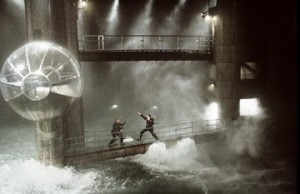
Ever been to a baseball game on a rainy day? You check the radar over and over, hoping that when you refresh your browser, the big swath of blue covering the city will have disappeared. You check the team website, half hoping the game will be delayed or canceled, even though canceled games are usually rescheduled for incredibly convenient times such as 2:00 pm on a Tuesday. Finally, you bundle up in your prophylactic rain gear, grab your umbrella, and trudge off to the game only to find out that while you were in transit, the game was indeed canceled about 15 minutes before the opening pitch. So you trundle back, rain somehow dripping down the back of your shirt. If you paid $35 for parking, you feel particularly sodden, as there’s no such thing as rain reimbursement. This is the kind of situation that makes people want to do a rain dance, or an anti-rain dance–anything to coax forth the sunshine.
Science fiction writers know the power, both cataclysmic and restorative, of Mother Nature. The sun goes down and suddenly the night fills with vampires, demons, and other baddies. Various creatures skulk around under cover of darkness and the world doesn’t seem to belong to the humans. And when the sun comes up, there’s always a collective sigh of relief.
Science fiction writers also know the power of manipulating Mother Nature.
In the Avengers, mad scientist De Wynter (Sean Connery) produces natural disasters that target specific areas, such as a hurricane that almost wipes London off the map.
In the Six Million Dollar Man/Bionic Woman crossover, the evil scientist (hired by the Soviets, of course) plots to steal a weather-controlling device that can conjure up hurricanes and wreak untold devastation.
Robert Heinlein wrote about governmental weather control in his 1941 novel, Methuselah’s Children.
Even Underdog’s nemesis, Simon Bar Sinister, invents a weather machine that induces tornadoes, floods, and other natural disasters.
While it’s not possible to create a hurricane to conveniently rampage your least favorite city or the home town of your worst enemy, it is possible for humans to control the weather.
In Moscow, scientists drive rain away when there’s an important event or holiday. They do this by shooting silver iodide into rainclouds, either from planes or from the ground, in a process called “seeding.” The water attaches to the silver iodide particles, which forms a hole in the cloud. If the cloud is dense, the water then falls immediately as rain or snow, and if the cloud isn’t dense, it scatters.
And for a mere $6,000, people can hire private companies to ensure that their weddings or outdoor parties won’t get rained out.
Moscow’s mayor proposed using the technique to divert snow from the city to avoid the cost of clean-up and traffic snarls. Some environmentalists who generally don’t oppose seeding, especially for irrigation and farming, argue that diverting snow from Moscow could cause increased snowfall in neighboring towns that may not be equipped to handle it. Snow also helps vegetation survive the winter and cleans the atmosphere. Advocates of the idea, which was actually put into limited practice in the 1980s, say that they don’t want to eliminate snowfall in Moscow altogether, only reduce its frequency and severity. A snowless Russian capital would seem particularly unnatural–what would they do with all those furry hats?
China has also embraced the idea, especially for the 2008 Beijing Olympics, and spends approximately $100 million per year on weather modification. Beijing’s Meteorological Bureau contains a Weather Modification Office, the world’s largest weather control operation, which employs 37,000 people. In addition to preventing inclement weather, the agency also induces rain to relieve droughts and dust storms and to aid in firefighting. China has had the most success of any country in weather modification, with Russia close behind.
Eventually, scientists want to figure out how to prevent major storms from forming. One idea is to coat areas of oceans with biodegradable oil, making it impossible for hurricanes to siphon water; another is to use techniques similar to seeding to disrupt funnel cloud formation.
As much as I dislike biking in the rain or getting caught without an umbrella, I’m glad the U.S. is behind China and Russia in weather modification. Among other things, as long as I’m a teacher, I need the prospect of snow days in the winter.
And just think about the effects weather modification would have on small talk. If we couldn’t complain about the weather, we’d have to find something else to grouse about. Then the floodgates would really open, and who knows what might come out.


